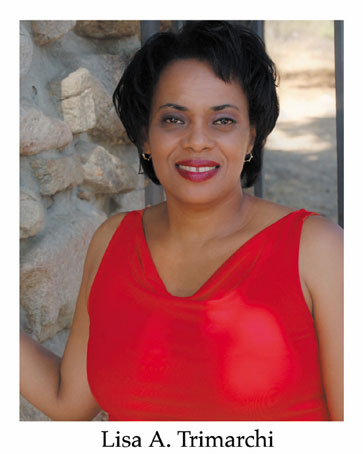Category: July 2009
Anthony Heredia – Fitness Couture Writer for Agenda Magazine
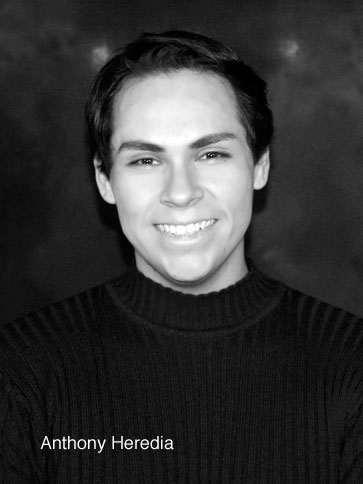 Health shouldn’t be intimidating. Feeling good about yourself is critical to living a fulfilled life. When you feel great, you radiate. Imagine what kind of world this would be if we were all happy and in good health. -Anthony Heredia-
Health shouldn’t be intimidating. Feeling good about yourself is critical to living a fulfilled life. When you feel great, you radiate. Imagine what kind of world this would be if we were all happy and in good health. -Anthony Heredia-
From teaching us how to drop a dress size in a month to informing us about the dangers of not getting enough sleep, Fitness Couture’s Anthony Heredia has been the voice of health and fitness for almost a year. I’ve heeded his advice many times and have seen for myself just how valid and necessary his contributions are.
You have a passion for fitness and health. What sparked that passion?
My passion for health and fitness started with my own weight loss story. I had been obese my entire life. I didn’t know a thin day until I was 18. I was tired of being 300 lbs and wanted to do something about it. I did what I always do when I don’t understand something, research. The first 40 lbs I lost with a popular weight loss program, but I soon became more knowledgeable than my counselors. I read everything I could get my hands on that related to weight loss. All my neighbors asked what my secret was, so I helped them with the little bit I knew at the time; and they lost weight. It was such a great feeling. I was hooked. I have now been in the health & fitness industry over eight years, 100 lbs of body fat lighter, and have had the pleasure of helping hundreds of lives personally; and now through Agenda I can reach millions. I beat the weight loss/gain cycles by educating myself, and now I am able to share that with others.
You’ve been writing for Agenda for a year now. How do you feel you have grown as a writer?
My style and skills in writing have grown exponentially, thanks to the highly experienced nurturing staff. I was a health guy in a high fashion world with no previous fashion affiliations; I had a lot to adapt to. I am a quick learner, so I attended numerous fashion events and asked countless questions to grow quickly. As a writer I have grown to be more empathetic to my readers and more conscious of their concerns and needs. My fashion-forward colleagues are a great resource for choosing topics relevant to our readers. They help me stay effective in translating confusing health and fitness information into the polished package that our readers can enjoy and apply to their lives. I believe to be a good writer, I must stay inquisitive and passionate and in tune with my readers.
Is there any particular health/fitness topic that is difficult to write about?
To be honest, no, but that’s because I am fascinated by the human body. By this fall I will have nine years of experience and eight health credentials, varying from fitness, nutrition, and weight loss to a Master’s in massage and physical therapy for balance; but I still believe you can never know enough. There is just so much to learn, but I love it all—that’s why it’s not difficult. I am going to remain a student of the human body forever. No one knows everything, regardless of how many degrees or years of experience they have. When I am asked to write an article about a subject I don’t fully understand, I get excited—time to research. I get the opportunity to dive into medical journals, textbooks, and research a subject I am passionate about, learn something new and grow. Nothing is truly difficult when you truly care. I am curious by nature, always wanting to know more so that I can translate it for those who need it.
What is your focus when you are writing? What do you want to accomplish with your writing?
My job when writing is to translate tedious technical medical info into something our readers can understand, enjoy, and apply to improve their lives. The deterioration of our nation’s health is not because of a lack of access to knowledge but a glitch in communication—translating this heavy information into something the average person can relate to and apply. People care; they are just lost and just confused by the barrage of information: “Whom do I listen to and believe?” I wish I could magically zap what I know into everybody in this world. I am invested in helping everyone I can because I believe that living a healthy life should not be luxury. I find it a privilege to serve as a translator to those who care to listen.
What are your goals in the fitness/health industry?
Although I am a health writer for a fashion magazine, I am invested long term in helping all people from every walk of life. I want to help improve the quality of life of as many people as I can on as large a scale as possible in my lifetime. I want to be a voice of reason in a sea of insanity and confusion. I want to empower by giving the tools needed to reach realistic health goals so people will lead happier, longer, more productive lives. It’s not always about looking great. Sometimes a mom just wants to keep up with her kids, or a dad wants to avoid health complications, or a grandfather wants to live to see his grandkids graduate from college. My ultimate goal is to learn as much as I can, condense and translate vital health and fitness information into realistic affordable solutions.
Your column is “Fitness Couture.” How does women’s fashion play a role in shaping an article? Are there any challenges writing for this demographic?
When I first jumped in, I wondered how a fitness grunt like myself was going to meld into this couture fashion world—but it wasn’t that hard. Fashion is art draped upon bodies that best reflect the artistic vision of the designer to bring their image to life. To me the human body is art, clay that can be shaped and molded with the proper vision and knowledge. I delved into the fashion world by simply studying everything about the numerous body types in runway shows as I sat and watched front row. While my editor broke down the fashion, I broke down the body underneath the fashion.
If you could offer three tips to people about health and fitness, what would they be?
There are NO magic bullets. 1) If it sounds too good to be true, walk away fast! For long-term results, you must learn about yourself and make positive changes in your lifestyle that work for you. Balance customized to your lifestyle is key. 2) There is always an answer. If you have a realistic goal and just can’t seem to reach it, don’t give up. Do your research and find compassionate help. There is always a solution but some problems you can’t beat alone. Don’t give up! 3) Work with your body, not against it. The human body adapts to what you do to it. Starve it and it goes into self-defense mode; over feed it and it stores the excess. Deprive it of rest and it becomes weak and slow. You get the idea? It is doing what it does best—surviving. Find a healthy balance and give your body what it needs and when it needs it consistently, and I promise your health and figure will transform significantly.
Interviewed by Kaylene Peoples
Lee L. Peoples: Copy Editor and Book Reviewer – The Second Artery that Is Agenda Magazine
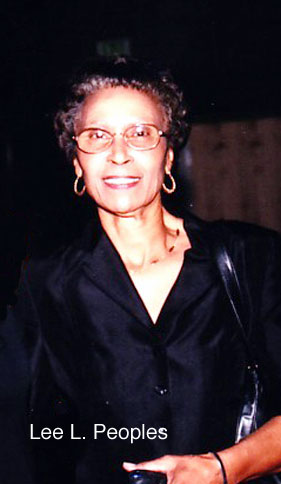 Agenda Magazine wouldn’t be what it is if it weren’t for Lee Peoples, our copy editor and book reviewer. It seems as though Lee lives and breathes syntax. She is the second artery that gets the heart beating. And Agenda wouldn’t be what it is today without her.
Agenda Magazine wouldn’t be what it is if it weren’t for Lee Peoples, our copy editor and book reviewer. It seems as though Lee lives and breathes syntax. She is the second artery that gets the heart beating. And Agenda wouldn’t be what it is today without her.
You have been the copy editor for Agenda since the very beginning. Many people would consider what you do extremely tedious. How do you feel about copy editing?
Yes, Agenda was begun in 2004, the last year of my teaching career in the classroom. It ideally fit right into what I had been doing for the better part of my life, and it was one of the goals I set for myself upon retiring the following year. I could still “teach English” without the daily commute, the only thing I hated about my work.
Some might think editing and proofreading tedious, but I enjoy it, especially when I see that what I do not only benefits the magazine but also helps the writers in some small way to be the creative writers they are. In most cases, it’s just a matter of synchronizing style; but in others my editing actually helps the writer become better. I love teaching, and I have always taken pride in fostering growth in others. And with each article I learn something new, as in every day in the classroom I always gleaned something new.
Give a little bit of your background.
I retired from the Los Angeles Unified School District in 2005, where I had spent forty-one years as a teacher of English. I received a Bachelor of Science degree from Grambling College, Louisiana, in 1960. Later, I did graduate work at UCLA and Cal State Long Beach. My first teaching experience was done in Augsburg, Germany, where I spent two years with my husband who was in the Army there. I began my family there. I also taught in the Army Education Center, where I prepared soldiers for the English part of the GED so that they could get their high school diplomas.
My teaching experience in California began in junior high school where I taught English composition and language arts to my favorites, seventh and ninth graders; and ended years later in senior high school. My experiences included teaching all levels of English and language arts, from remedial to average to advanced placement. I have been English department chairperson, master teacher, training teacher, and mentor to many new teachers. I have worked with the district in curriculum. I owe my many successes to my own love of learning, originally engendered in me by my parents and older siblings, and my insatiable thirst for knowledge. As I teach, I learn.
I always modeled my teaching after my high school English teacher, whom I credit with most of what I learned about my field even before I went to college. Growing up in a small town in South Louisiana, I am fortunate to have had Mrs. Herbert as my English teacher for all four years of high school.
Did you ever have a favorite article, writer, etc., related to the magazine?
Gee, they are all my favorites. Not only do I enjoy reading the articles, but I am always learning something new. And I just love working with everyone.
You also do the book reviews. What’s involved in reviewing a book for a magazine?
As in the classroom, my goal is to create interest in the book and hopefully get the reader hooked enough to read that book. I generally write about what I liked about the book, whether it is the plot, the characters, the setting, theme, style, etc. Sometimes my intent is clarification.
What is involved in copy editing?
Simply making sure that the writing is clear and the style is consistent. Clarity involves sentence structure, paragraph development, correct grammar, spelling, punctuation . . . knowing when to break the rules to suit the occasion.
What is your opinion of the way we use language today? If you can, give examples of media, social situations, and print.
A stickler for the correct use of language, I cringe at its abuse. This abuse is not deliberate but is often the result of a lack of knowledge of the grammar of the language. It is too bad grammar is not taught in the classroom as it used to be. In many cases the only grammar a student learns is in ESL (English as a Second Language) classes or in foreign language classes. For example, the highly educated news commentator might say, “. . . between you and I,” simply because he/she does not know that between is a preposition and must be followed by an object, in this case, “me.”
To be confident of punctuation in writing—an absolute necessity for clarity—one needs to know the rules. Where should these rules be taught? In the classroom, the English classroom, that is. An understanding of grammar and knowledge of punctuation rules contribute to reading comprehension. The misuse of some verbs can be remedied by simply knowing their meanings and their principal parts. Where taught? Again, in the English classroom (and, of course, exercised in all the disciplines). So instead of, “She’s layingdown in her bedroom,” the speaker or writer says/writes, “She’slying down. . . .” Lie, lying, lay, lain—intransitive, “to rest or recline”—as opposed to lay, laying, laid, laid—transitive, “to put or place (an object).”
Anything you’d like to add about what it is you do and your passions for the English language?
I love the English language, and this leads to my passion in helping others in their oral and written communication.
Are there any highlights you’d like to share about what you do?
I’ve had lots of highs. Contributing to the success of the magazine and helping the writers are just two of these highs.
What advice if any could you give to writers?
Continue to aim for clarity. Writing is rewriting. Keep up the good work.
Interviewed by Kaylene Peoples
Arun Nevader – Photographer and Agenda Magazine Gem
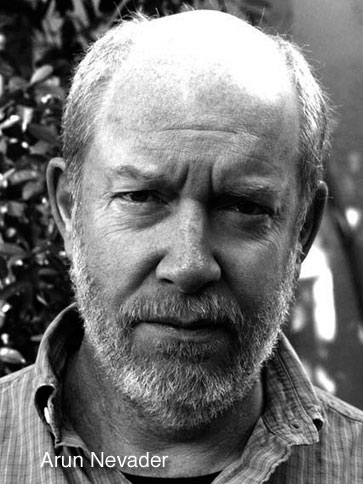 Winter 2009, Anne V. from the Victoria’s Secret Runway Show graced our cover. Beautiful images from Los Angeles, New York, San Francisco, and Miami Fashion Weeks entertained our readers and brought the best fashion around to Agenda Magazine, not to mention the exclusive behind the scenes and celebrity coverage. Photographer Arun Nevader was partially responsible for creating the high standard that is Agenda. I remember when I first met Arun at New York Fashion Week. Agenda was still very new, and I was paying my dues videotaping runway shows on the riser. He came to my rescue as I was fighting for my right to be there along with the veterans. I knew he was special back then, but having his contributions these past few years has truly been a blessing.
Winter 2009, Anne V. from the Victoria’s Secret Runway Show graced our cover. Beautiful images from Los Angeles, New York, San Francisco, and Miami Fashion Weeks entertained our readers and brought the best fashion around to Agenda Magazine, not to mention the exclusive behind the scenes and celebrity coverage. Photographer Arun Nevader was partially responsible for creating the high standard that is Agenda. I remember when I first met Arun at New York Fashion Week. Agenda was still very new, and I was paying my dues videotaping runway shows on the riser. He came to my rescue as I was fighting for my right to be there along with the veterans. I knew he was special back then, but having his contributions these past few years has truly been a blessing.
When did you become a photographer, and what was the motivating factor?
Well, I started as a photographer in Central America in the early 80s, working extensively in Guatemala and El Salvador during their insurgency conflicts, though El Salvador was more a civil war than an insurgency campaign. It was there that I learned how to photograph people in the midst of events, often tragic and horrifying. I left photography in the mid 80s and didn’t return to it until my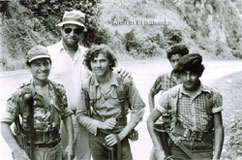 son, his partners, and a core of talented entertainment photographers founded WireImage in 2001. I became one of the early WireImage photographers working under the guidance of the founding photographers. Those were exciting times for this business.
son, his partners, and a core of talented entertainment photographers founded WireImage in 2001. I became one of the early WireImage photographers working under the guidance of the founding photographers. Those were exciting times for this business.
I understand you are also a teacher. Tell me a little about that. And how does being a teacher affect your craft?
Yes, I’m a lecturer in the College of Engineering at UC Berkeley. I teach information design for technology development in the Technical Communications Program. I’m not sure what qualified me for the job other than being in the right place at the right time—I’ve considered Berkeley my home since 1967. My graduate work is actually in Early Modern British Studies, and my field of expertise is the influence of French neo-classical painting on the British Gothic literary imagination as it appears in both fiction and the commercial stage in late 18 th century Britain. There is absolutely no relation between these two worlds of cultural literary studies and quantitative information design. But I also have extensive experience in structural engineering as a builder of some fairly large commercial projects. So I guess my language skills, together with a strong knowledge of civil engineering practice was a strong skill set for the position that I accepted in 2000 at UCB. It’s been a dream job for reasons like trying to explain the taste of sweet to someone who has yet to taste it. I teach graduating seniors across several engineering disciplines, which often means that I’m working with some of the brightest minds on the planet. Why is this so gratifying? I’m clearly the class idiot, most GPAs are hovering at the 4.0 range—some higher! And I get to read 50 of the most exciting technology projects under development at Berkeley. These projects change from year to year, so I’m always about 6 to 10 years ahead of the marketplace—things like smart dust (autonomous intelligent particles the size of a period on the page, floating in mid-air, gathering and transmitting information, or synthetic blood, or quantum computing for fail-safe data security, or thin-film solar, some either classified or proprietary—you get the idea. I wake up on a Tuesday or Thursday and say, “Wow, today’s a school day!” My mother always used to tell me that I’d be an engineer one day. Well, Mom (she died in 1964), not quite but close enough, perhaps better!
I don’t see that much in common between my academic life and my life as a photographer. My students, of course, love my photos, as it’s a well-known fact that engineering students at Berkeley have no life beyond their latest problem set. But for me, the worlds are totally separate. Since I know a fair amount about digital imaging technologies, I can often use them to explain relevant issues in the classroom, but that’s about it.
What were some of the highlights of your career? (For example, the most exciting photo-shoot, biggest job, etc.)
Well, starting from the WireImage days, they are almost too many to list. First of all, it’s important to understand that I’m a press photographer who shoots mostly entertainment and fashion. I wouldn’t call myself an artist, but an observer. Sometimes, if rarely, the photo does achieve that extra status as somewhat remarkable, but it’s usually in spite of it all. If I had to choose a couple of moments, it would be shooting for People Magazine for a Michael J. 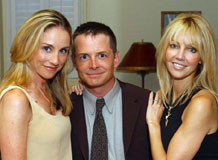 Fox event. Michael, his wife Tracy, and Heather Locklear were there for the event. Michael’s publicist came up to me seconds before getting what I needed and said to me, “Arun, you get three snaps. I better not hear a fourth. Make sure you get it in three.” Well, I got it in three, though that’s often hard to do. My highlights have been in shooting the bigger film festivals such as Sundance and Telluride, not to mention the San Francisco International Film Festival a few years ago. I had Sharon Stone, Phil Bronstein, Warren Beatty, Annette Bening, Sean Penn, Kevin Spacey, and Robin Williams in a hotel room, and I was the only guy in there for most of it. I thought I had died and gone to celebrity heaven. Most recently, I’d say being able to photograph Justin Timberlake and Anna Wintour together posing for me. You’ll never see that combination again. I’ve had too many of those kinds of
Fox event. Michael, his wife Tracy, and Heather Locklear were there for the event. Michael’s publicist came up to me seconds before getting what I needed and said to me, “Arun, you get three snaps. I better not hear a fourth. Make sure you get it in three.” Well, I got it in three, though that’s often hard to do. My highlights have been in shooting the bigger film festivals such as Sundance and Telluride, not to mention the San Francisco International Film Festival a few years ago. I had Sharon Stone, Phil Bronstein, Warren Beatty, Annette Bening, Sean Penn, Kevin Spacey, and Robin Williams in a hotel room, and I was the only guy in there for most of it. I thought I had died and gone to celebrity heaven. Most recently, I’d say being able to photograph Justin Timberlake and Anna Wintour together posing for me. You’ll never see that combination again. I’ve had too many of those kinds of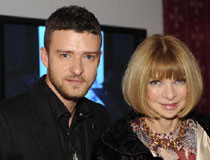 moments to recount here. Overall, I’d say that I’m just now hitting my stride in highlights, and it did not happen until I started shooting backstage fashion for Dan Lecca in New York. Celebrity photography can be exciting, but shooting beauty in its highest register is transcendent and the dream of many photographers.
moments to recount here. Overall, I’d say that I’m just now hitting my stride in highlights, and it did not happen until I started shooting backstage fashion for Dan Lecca in New York. Celebrity photography can be exciting, but shooting beauty in its highest register is transcendent and the dream of many photographers.
You have had the opportunity to shoot with a lot of amazing people. I know that you have shot Victoria’s Secret show a few times now. What was that like?
Yes, well, I’ve shot VS for three years now, and the last two seasons for the designer. When you shoot for the designer, you get the best spot on the floor. 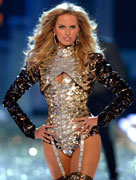 So my spot is always directly to the left of the giant CBS TV camera. The show is lit for TV and staged for TV, so they care far less about the still photographers. But when you’re right next to the TV guy, then all the models are looking right down your lens and you’re always eyeball to eyeball with them. Everyone else is shooting from underneath, which is an entirely different angle and a compromised photo. Many of the models in the VS show are actually New York runway models, most of whom I know from New York Fashion Week. So it’s great to see them in the VS show. They are second billing to the VS angels—the contract models—is always hard to believe, but still true. The VS show is the runway spectacle of the year. It’s probably the only show where the model is in fact the center of attention, not the fashion. Shooting backstage last season, especially in available light was extraordinary. Everybody understands that we’re all here to make it work and the models are terrific to work with, even with six people in their hair.
So my spot is always directly to the left of the giant CBS TV camera. The show is lit for TV and staged for TV, so they care far less about the still photographers. But when you’re right next to the TV guy, then all the models are looking right down your lens and you’re always eyeball to eyeball with them. Everyone else is shooting from underneath, which is an entirely different angle and a compromised photo. Many of the models in the VS show are actually New York runway models, most of whom I know from New York Fashion Week. So it’s great to see them in the VS show. They are second billing to the VS angels—the contract models—is always hard to believe, but still true. The VS show is the runway spectacle of the year. It’s probably the only show where the model is in fact the center of attention, not the fashion. Shooting backstage last season, especially in available light was extraordinary. Everybody understands that we’re all here to make it work and the models are terrific to work with, even with six people in their hair.
Is there anything unique about the way you shoot, like special techniques, lighting style, etc.?
I try to see the image before I shoot it. Since I shoot mainly backstage now, that is even more important. The image usually lasts for a fleeting moment. You either get it or you don’t. There won’t be a second chance in many cases. But I’ve learned that in shooting the top 50 models backstage, it’s just as important to know what else is in the shot besides the beauty. Those other things are often the things that will make the shot. Going for color, balance, depth of field, and the timeless strangeness of rare beauty—those are the things I look for. What’s strange about beauty at that level is that it’s transformative. Oftentimes, an odd, very young, overly thin, wispy girl walks in the backstage door to sit down for makeup and hair. She walks in often with bad hair and bad skin, and in the space of two hours undergoes a metamorphosis into the true beautiful form she can then fully embody. I shouldn’t say that this is only the provenance of female models. Male models are equally overwhelming in their level of beauty and oftentimes even more surprising, though usually less so in the transformation that takes place in hair and makeup. As far as camera technique is concerned, I like to get it as perfect as possible right out of the camera with as little image processing as possible. That’s not always possible because of skin and other factors. Bad skin in models, by the way, has more to do with constantly being in new makeup and having lots of hands on your face—a health concern that is now only beginning to be addressed.
Who are some of your influences, if any?
Helmut Newton, Herb Ritts, and Michael Caulfield, to whom I will always be indebted.
Tell me about what you’re doing now.
Miami Swim Shows will happen in July, New York in September, flying to Iceland for two days in September for their yearly Fashion Week, then Los Angeles Fashion Week, Victoria’s Secret again in November, and a host of individual events scattered throughout.
What was the highest high of your career?
Having a tall dynamite blonde at a high profile party almost run me over as I was 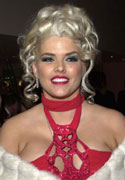 about to take her photo the night of the Oscars in 2002. She was too beautiful and too crazy for words. And I said, “And, Miss, can I get your name please?” “Yes, you can call me Anna Nicole.” It was my first Oscar party, and a quarter-page photo ran in the New York Postthe next day of Anna Nicole Smith with my by-line.
about to take her photo the night of the Oscars in 2002. She was too beautiful and too crazy for words. And I said, “And, Miss, can I get your name please?” “Yes, you can call me Anna Nicole.” It was my first Oscar party, and a quarter-page photo ran in the New York Postthe next day of Anna Nicole Smith with my by-line.
Were there any lows?
Yeah, when I mistakenly reformatted a card that had probably $10,000 worth of celebrity images on it. It was the Playstation 2 party celebrity arrivals event in Los Angeles back in 2002. Too painful to remember. I can’t thank you for reminding me of my stupidity, but I can appreciate the lesson.
What advice would you give to aspiring photographers?
Keep shooting all the time. It’s increasingly difficult to make a career out of it, so know why you’re doing it. Never say no to a job, and always respect your limits, which end at the end of your lens. There’s a lot to say about this world, and hard to get it into a single paragraph. So anyone who wishes to know more can contact me at arun@arunnevader.com
Any last words?
I never knew it until much later in life, but photography is a form much like poetry—that is, a language frozen in its unique time, this time in its frame. Always try to see the frame when you can—the rest will be contained therein. One last word on technique—always push the limits of your lens and never go for the easy shot unless you have to.
Interviewed by Kaylene Peoples
Elana Pruitt – 5 Years of Talking Chic
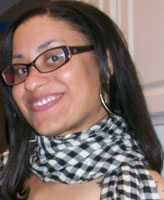 “I think having the insight to connect with a woman is built off of how I feel inside. Having a pear-shaped body, it was difficult finding pieces.”—Elana Pruitt—
“I think having the insight to connect with a woman is built off of how I feel inside. Having a pear-shaped body, it was difficult finding pieces.”—Elana Pruitt—
Since the third issue of Agenda Magazine , Elana Pruitt has been writing the fashion column “Talking Chic.” The column has touched on almost every subject related to fashion with Elana’s perspective and reflects what many of us are thinking. But no one can tell it quite like Elana. Since that Winter 2004 issue, the column, the webzine, and its author have evolved.
“Aaah, the leisurely luxury of online browsing. What was once a pastime for me—you know, like checking a couple of favorite websites to see what’s new—has turned into a scheduled, relaxing activity”
—Elana Pruitt’s first Agenda article, “The Leisurely Luxury of Online Browsing”—
Talking Chic’s topics have ranged from cleaning out your closet to finding the right teeny weeny bikini for every sized woman. Elana has managed to make us feel comfortable about our bodies and think outside the box when it comes to fashion. So after almost five years with Agenda, it was my pleasure to put Elana in front of the camera and ask her a few key questions about “Talking Chic,” and the direction she has taken her career.
Elana is also the owner of “Good Girl Gone Shopping,” which is a personal shopping, wardrobe consulting and styling business. She is also the senior editor of PlasticSurgery.com and Beautychatblog.com. In addition to being a fashion blogger, Elana has a website, which is an extension of “Good Girl Gone Shopping,” formerly known as “Diary of a Personal Shopper.”
How did you get started?
I actually got started with fashion writing . . . you (Kaylene Peoples, editor in chief of Agenda Magazine) invited me on when I was in college. I was at Nordstrom in the TBD and Savvy department. And I started building up a clientele of women who were looking for trendy and modern fashion. So in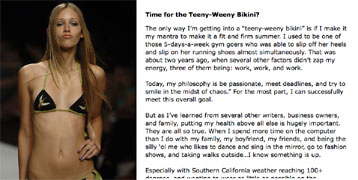 keeping contact with her, it just started. So five years I’ve been with Agenda Magazine and that really branched off into other opportunities with various online publications. I felt confident enough to start my own blog, which is an extension of “Good Girl Gone Shopping.” I then moved on to PlasticSurgery.com, where I am the senior editor and writer. I say moved on, but I am still doing various projects at once. So really it started off with Agenda Magazine .
keeping contact with her, it just started. So five years I’ve been with Agenda Magazine and that really branched off into other opportunities with various online publications. I felt confident enough to start my own blog, which is an extension of “Good Girl Gone Shopping.” I then moved on to PlasticSurgery.com, where I am the senior editor and writer. I say moved on, but I am still doing various projects at once. So really it started off with Agenda Magazine .
How did you know you had a special eye for fashion?
I don’t know if I ever knew I had a special eye. I just love color! I loved playing dress-up. My mom always tells me that when I was a child, I put a skirt on my head because it was pink and I just wanted to go out in public and feel fabulous, and she let me. I was about five then. Because fashion really expresses your personality, I’ve never seen a limit to that. I never thought there were boundaries and I always believed there shouldn’t be. So it just innately developed.
Tell me about “Good Girl Gone Shopping.”
 It’s still a personal venture and is still growing, but it started off by helping girls in the office. At PlasticSurgery.com I always played around with footwear, and gradually girls would come up to me and say, “Elana, I’m going to a wedding. What do you think I should wear?” And I’d throw something out like, “Wear a black dress, wear colored shoes, but throw a clutch on.” Word started to spread, and on our breaks I offered to go with my co-workers to Target and Macy’s. It was then that I started realizing that not only was I helping them, but we did it within an hour, under their budget. Everything we found was on sale. I started to realize that women desired my services. Instead of just helping them in the store, I started going into their rooms and their closets. My biggest focus now is helping them stylize with what they already have, and they don’t need to spend a penny. It’s very exciting now because they now realize that all of their clothes are versatile. Basically go into your closet and play dress up. “Good Girl Gone Shopping” is really to bring out the inner fashionista with no limits.
It’s still a personal venture and is still growing, but it started off by helping girls in the office. At PlasticSurgery.com I always played around with footwear, and gradually girls would come up to me and say, “Elana, I’m going to a wedding. What do you think I should wear?” And I’d throw something out like, “Wear a black dress, wear colored shoes, but throw a clutch on.” Word started to spread, and on our breaks I offered to go with my co-workers to Target and Macy’s. It was then that I started realizing that not only was I helping them, but we did it within an hour, under their budget. Everything we found was on sale. I started to realize that women desired my services. Instead of just helping them in the store, I started going into their rooms and their closets. My biggest focus now is helping them stylize with what they already have, and they don’t need to spend a penny. It’s very exciting now because they now realize that all of their clothes are versatile. Basically go into your closet and play dress up. “Good Girl Gone Shopping” is really to bring out the inner fashionista with no limits.
Let’s say I’m a woman slightly overweight, 185 lbs., and 5’4″. I’m going to a class reunion, haven’t seen my fellow classmates in 10 years. And I’m nervous because I put on this weight. What can I wear that is going to make me look fabulous?
I think for a woman who could be self-conscious about being overweight and she’s going to her reunion, black (to me) is always everyone’s best friend because it is slimming. Of course, it matters what she’s wearing. I would suggest a nice slack and some kind of black blouse and then focus color elsewhere—a fabulous shoe, a fabulous clutch, a cardigan, a necklace—something that can bring the eye elsewhere. So if she’s self-conscious about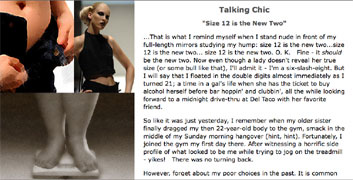 her stomach or her arms, play around with other parts of the body. Fancy footwear is so exciting because you can play around with it. And again it brings the eyes elsewhere. I would suggest starting with the basics, a black, maybe a charcoal, a chocolate brown. Once she has her basics, then she can play around with accessories. So I would think a woman who is overweight going to her class reunion should focus on the accessories and the outer aspects of fashion.
her stomach or her arms, play around with other parts of the body. Fancy footwear is so exciting because you can play around with it. And again it brings the eyes elsewhere. I would suggest starting with the basics, a black, maybe a charcoal, a chocolate brown. Once she has her basics, then she can play around with accessories. So I would think a woman who is overweight going to her class reunion should focus on the accessories and the outer aspects of fashion.
You always hear people talking about how you might not be accessorizing an outfit correctly. Would you say that color plays a big role in accessorizing an outfit?
Color and accessories depend on the person’s personality. If a woman lives in black and she loves it, that’s her style. However, a great necklace with some turquoise can really make it pop. I think accessories offer a great opportunity to play with color. It’s trial and error. Someone who doesn’t usually wear accessories shouldn’t just wear a bright pink necklace and just throw anything on. It really takes a lot to find pieces that match who a person really is.
What do you term yourself as?
I call myself a fashion writer because of my perspective of fashion. From that perspective, I have thoughts and opinions, and that’s when I express them.
Highest High
Fashion Week 2006, interviewing a designer backstage. There were a few different situations where I was interviewing Kevan Hall and his closet of clothes before the show started, being on the runway afterwards and speaking to the designer of Single [Galina Sobolev], and when I realized I was among other professionals who are doing what I’ve always wanted to do. I realized it couldn’t get much better than this. I am now speaking to those who also have a passion. Sitting at the shows, sitting in the 2 nd row—I remember there was a time when I was sitting behind Wesley Snipes. He turned around and I gave him my card. I remember thinking to myself, “In college I never would have dreamt that I’d be in a situation where I would be just as important as the A-listers, as the celebrities.” My role was needed there. A writer was needed, and I was there to serve that purpose. I believe Fashion Week during that year was my highest high.
Where do you see yourself in five years?
Five years from now I would love to eventually have “Good Girl Gone Shopping” as a corporation. I live in the Inland Empire in Upland, California. I would love to be the “go-to” person for all women’s needs and men’s needs. I have helped some male clients look for suits and look for sweaters. I really want to build that business. That would be my goal to make it thrive. Eventually branch off into the LA and Orange County area. But I’m always going to be a writer. I would like to have a book out where I notate all of my experiences thus far. I have grown quite a lot.
You said you help men with their fashion, too. What’s that like?
Women are a little more self-conscious and a little more insecure with their bodies. One male client I had was leaving for an unexpected trip and told me what he wanted, suits and casual jackets. He gave me the color scheme. I went to JC Penny, found everything within an hour or two. It is an easier purchase because men don’t like to fuss. With women, you have to pay a little more attention to what they’re feeling inside.
What do you do when people are stuck on one color? What advice could you give to help them choose more of a variety?
To really convince a person that a color isn’t that flattering, or maybe they’re always wearing the same color and it’s in all their pictures, I would ask what is it about the color they like? For instance, purple. If someone is wearing that a lot, I’d like to know what is it about that color that appeals to them? How does it make them feel? They can still wear that color by wearing accents of that same color.
You’ve written some really interesting columns for “Talking Chic”: 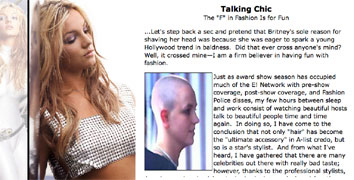 Tattoos, Brittney Spears bald, the teeny-weeny bikini . . . . What has been your inspiration for “Talking Chic”?
Tattoos, Brittney Spears bald, the teeny-weeny bikini . . . . What has been your inspiration for “Talking Chic”?
At seven years old, I always had a journal. Talking Chic is me talking, but talking about it in a chic manner. That’s where the name came from. I’m assuming everyone’s listening, but it’s more of me getting my thoughts out because I am sure it’s something people can relate to.
Any Lows?
I’ve learned to always do my research before I go to events, interview anyone, or write anything. One time I went to an event and I wasn’t the most appropriately dressed and I actually didn’t know who would be there. I once was interviewing one celebrity and there was a celebrity next to that person and I didn’t know her name. I knew she was a fan of that designer, but I should have researched all the celebs that were fans. Doing your research is number one because you want to show people that you know what you’re doing. You need to make sure that you are doing your all to prove that you deserve to be there. So doing your research is number one.
Interviewed by Kaylene Peoples
Kaylene Peoples, Founder and Editor in Chief – Up Close and Personal Reflections of Agenda Magazine
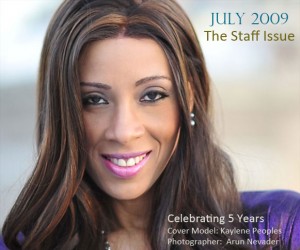
It’s been five years since the start ofAgenda Magazine, www.agendamag.com. That very first issue back in summer 2004 featured actress Bai Ling on the cover as well as a list of prestigious fashion professionals: J. Alexander (ANTM), Coco Kliks (designer), Sue Wong, and more. We were still feeling our way around this online publishing world. Being the first fashion webzine to stream video, that trend caught on like wildfire. And as you can see, it’s everywhere now. We’ve featured now famous designers (Rami Kashou) who at the time were just starting their careers, and we’ve seen some (Anand Jon) rise to the top then fall from grace.
Agenda Magazine‘s list of distinguished interviewees include handbag, fashion, and jewelry designers, actors, actresses, musicians, kitchen designers, chefs, wedding gown designers, doctors, autism and breast cancer survivors, entertainment, fitness, dance companies, beauty and fashion professionals. And many contributors have come and gone, but their legacy will always live on in Agenda. Those who’ve contributed regularly in the past are as follows: Devino Tricoche (photographer), Natalie Martin (political writer), Patricia Lee (writer), Kevin Foster (writer), Ali Saam (spokesperson) and Sherman Hill (columnist). Each has gone on to successfully pursue other avenues.
What was my highest high?
I ask everyone I interview that very same question. And honestly, I can’t even answer that question because there have been so many highs with thismagazine. I could say the highest high was getting this issue together, or I could say the same thing about our Spring 2005 issue. Every issue has been a high; and once that issue is done, it’s on to the next. I think the highs are the fact that our readers love us and they’re loyal.
Highlights
Hurricane Katrina hit, and as we know, several people were devastated by this natural disaster. Photojournalist (Leslie Lormann) was invited to go on the Oprah show because of her photo-journalistic spread that we ran in the magazine. And we’re very proud of her for that. She put herself out on the limb to contribute to such a horrifying situation. She put her life in danger to document what was actually going on over there.
Raun Kaufman, an autism spectrum survivor, was interviewed back in Spring 2007. He continues to help children with autism, cerebral palsy, and Down’s syndrome recover and lead normal lives. We did a pod cast, and a lot of people started researching alternative methods of recovery for their affected children.
Pooja Batra (Bollywood Star), Apollonia Kotera, Keith Munyan, Sheryl Lee Ralph (HIV awareness), non-invasive plastic surgeons, celebrity stylists offering tips to the average woman, eco-friendly designers, and everyday heroes that we just don’t hear about have all graced our pages.
Lowest Low
The lowest low has been time. We get so many requests to interview, run editorials, or feature things in the magazine, and there’s just not enough time. There weren’t enough issues to actually accommodate all those who have been asking. Agenda Magazine has been quarterly for five years. That means only four issues a year. Those issues were jam-packed. But unlike a monthly or bi-monthly, we had to really select carefully what actually went into each issue. That was something that I wanted to change, I wanted to rectify this year. We’re going to be putting out monthly issues, and we will be trying our best to focus more on things that we haven’t been able to feature in the past.
Green fashion has been a very big thing for the magazine. We are trying to stay proactive. And we’re trying to do the right thing in this crazy world that we’re in where our natural resources are being depleted and our economy is in a mess. By supporting the green movement, we feel that maybe our readers will start buying eco-friendly fashion, eco-friendly cars, and maybe the rest of the world will follow suit.
Agenda Magazine has a spokesmodel. How did I come up with that choice?
Lindy Flowers is our spokesmodel who came onboard about a year ago. She’s a mother of two and is still modeling after ten years. I felt she really represented the real world as opposed to someone who is just starting to model. Lindy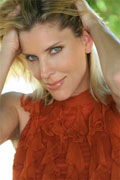 continues to model and is working almost daily. She just recently did a Volkswagen campaign in Europe. I think she represents what modeling should be. You shouldn’t have to stop modeling when you turn 24. They say if you’re 12-15, you’re just probably the right age to start modeling. If you’re 18 starting, you just might be over the hill; and by the time you’re 24, your career is over. Well, I don’t know if I agree with that. I’d like to be one to help change that, and I think Lindy is the perfect representation of what modeling should be. Because, you know what? We’re living longer. We’re not dying off at 55 or 60 anymore. This world is getting older. I believe there are those who want to see more mature models. Fashion comes in all shapes and ages.
continues to model and is working almost daily. She just recently did a Volkswagen campaign in Europe. I think she represents what modeling should be. You shouldn’t have to stop modeling when you turn 24. They say if you’re 12-15, you’re just probably the right age to start modeling. If you’re 18 starting, you just might be over the hill; and by the time you’re 24, your career is over. Well, I don’t know if I agree with that. I’d like to be one to help change that, and I think Lindy is the perfect representation of what modeling should be. Because, you know what? We’re living longer. We’re not dying off at 55 or 60 anymore. This world is getting older. I believe there are those who want to see more mature models. Fashion comes in all shapes and ages.
Where Do I See Agenda Magazine in five years?
I see Agenda Magazine on the shelf in five years. I see it being a voice of fashion and human interest in five years. I don’t see it being gone in five years. I definitely see the magazine thriving. And I feel that it will continue to grow.
One thing that was born out of the magazine is our non-profit Agendafoundation.org. We started the filing process over three, years ago and now we are a 501(c) 3. It is an accelerated film school for foster youth. We are trying to bring some consciousness to this particular group of children.
How did the magazine come to be?
You know it’s funny, because the magazine came to be based upon my own desires, really. I’m an entertainer, jazz singer/flautist, I used to model, and I’m a filmmaker. That’s where the streaming media came in—that’s where the fashion 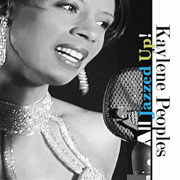 came in, and one of our most recent additions, the Indie Hotspot, which caters to independent musicians and film—and that’s where that section came in. I’ve been an entertainer for a long time, and it has been a struggle to make it in this industry. And I know that a lot of people also struggle. If I did, I know they did. The answers are not always so easy when you’re an entertainer—and an independent one at that when you don’t have a label. And there’s really only a small percent that actually get signed to a record label. It’s so small that it’s laughable. There are more artists out there than you know. With the advent of Myspace, and now Facebook and Twitter, and some of these other online outlets, a lot of that talent is now finally being heard. But I thought that it would be very proactive if we actually did something, too, to help the cause of the independent entertainer, singer, actor, filmmaker. That’s why the Indie Hotspot was born, as a result creating another demographic. We ended up bringing in the 18-30-something male readership by introducing that section.
came in, and one of our most recent additions, the Indie Hotspot, which caters to independent musicians and film—and that’s where that section came in. I’ve been an entertainer for a long time, and it has been a struggle to make it in this industry. And I know that a lot of people also struggle. If I did, I know they did. The answers are not always so easy when you’re an entertainer—and an independent one at that when you don’t have a label. And there’s really only a small percent that actually get signed to a record label. It’s so small that it’s laughable. There are more artists out there than you know. With the advent of Myspace, and now Facebook and Twitter, and some of these other online outlets, a lot of that talent is now finally being heard. But I thought that it would be very proactive if we actually did something, too, to help the cause of the independent entertainer, singer, actor, filmmaker. That’s why the Indie Hotspot was born, as a result creating another demographic. We ended up bringing in the 18-30-something male readership by introducing that section.
What advice would I give to someone trying to start his/her own online magazine?
Content is the biggest thing that will keep your magazine going. We’ve never had a problem with content here at Agenda Magazine.There’s plenty of it. The secret for me was I just wrote about what I loved, or I let our writers write about what they loved. As a result, the magazine has thrived. Instead of chasing theaudience, I let the audience chase us. And that’s probably the best advice I could give to someone who wants to start his/her own online magazine. Find the things that you’re interested in. Find the topics that you love and that you’re passionate about and write about those because those will never go away, and there’s always something to write about. But if you’re chasing an idea that you’re not 100% sold on or even sure about, you’re sure to fail. It’s better to just go with what you feel and what you know and be eager and curious to learn more. So here’s to the next five years!
Kaylene Peoples, Agenda Magazine’s Founder and Editor in Chief
To Learn more about Kaylene, visit:www.myspace.com/kaylenepeoples. Visit Agenda atwww.myspace.com/agendamagazine andwww.twitter.com/agendamag. To give a donation to Agenda Foundation, visit www.agendafoundation.org.
